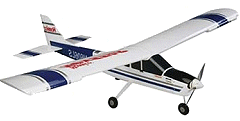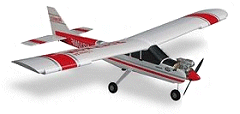Gas (IC) vs. Electric (EP) RC Flying
- Which is Best for You?
The big question... which power type wins in the gas vs. electric rc flying battle?
It's a well-argued question, and as ever there are pros and cons to each. Hopefully this article might help you decide which type of powered rc airplane to choose, if you're stuck in the "can't decide" category.
By the way, we're loosely using the term 'gas' to cover the primary IC (internal combustion) types i.e. glow plug and petrol. Electric power is commonly abbreviated to 'EP'.
Flying rc airplanes (and helicopters) has exploded in popularity since the early 2000s, and it's probably fair to say the hobby has been one of the fastest growing hobbies in recent years.
This has largely been due to electric rc airplanes and helicopters becoming so widely available, more affordable and easier to fly than ever before - a great result of the ongoing global electronic revolution.
Even more recently, electric rc drones have really pushed the hobby in to the limelight, in both good and bad ways.
Modern radio control products like brushless motors and lithium polymer battery packs have turned the electric side of the hobby around, to the point where top-end brushless/Li-Po powered rc aircraft can match an IC powered equivalent for performance and duration. That was unthinkable not that long ago.


Above: a tough call: the electric Hobbico NexStar Select EP (left) and
its glow powered cousin (right) roughly matched in performance and price.
Traditionally at rc flying club fields you would have seen a larger number of gas rc airplanes and very few - if any - electric ones. But these days, go to an rc flying club and the mix of gas and electric planes might be 50/50, or maybe even more electric than gas.
Of course, gas rc flying continues to be enjoyed by many modellers and always will be, but there is a rapidly growing percentage of flyers that have moved over to electric flight, or at least flying electric planes and helicopters alongside their IC powered ones.
And, significantly, some major manufacturers of glow plug engines (the mighty OS, for example) have started producing quality electric brushless motors and electronic speed controllers, so that says a lot about how far EP has come.
Gas (IC) vs. Electric RC Flying - Pros, Cons & my Thoughts
As with everything, there are two sides to consider in the gas vs. electric rc flying argument. Opinions and preferences are always personal, and the IC vs. EP argument is always a very lively one.
So below is a little comparison chart that I've come up with, showing some fundamental points to consider when trying to decide between gas and electric powered rc aircraft.
| POINT | GAS (IC) | ELECTRIC | COMMENTS |
| Price to buy. | Generally speaking more expensive for the beginner. | Can be lots cheaper because simpler EP planes are available. But high-end electric setups can be costly. | You can definitely get started for less with electric. |
| Availability. | From specialist model/hobby shops. | From hobby & many toy shops. | IC models are more specialised, simpler EP ones can be bought from a wider variety of places. |
| Additional / ongoing costs. | Generally higher; fuel, accessories and possible club membership necessary. | Less costs, although large Li-Po motor battery packs can be pricey. | Fuel is the major ongoing cost for IC, plus additional items to start the engine are necessary. Not so with EP. |
| Learning curve. | Steeper for a 4 channel plane, which IC ones tend to be. | Less steep if you buy a smaller 2 or 3 channel EP plane. | Not too different really. Having IC means having to learn about engine maintenance. |
| Environmental issues. | Noisy & messier. | Quiet & clean. | You won't disturb many folks with electric flying, although a well-silenced 4-stroke engine can be quiet. |
| Club membership. | Almost essential unless you have good access to private land. | Not as essential. | More EP planes can be flown in public places. IC planes do carry a higher 'nuisance factor' because of the noise. |
| Accessories. | Essential field items are needed to start and run the engine. | Few needed but spare battery packs and a good charger are necessary. | Gas planes require more because of the engine, but at a club you can always borrow these to begin with. |
| Maintenance. | Moderate. | Very little. | The engine makes gas planes require more ongoing maintenance, but you'll get to learn more! |
| Repairability. | Moderate to complex. | More straightforward if it's a foam plane. | Depends on the construction of and damage to the plane, but foam is easier to repair than balsa/ply. |
| Flight times. | Depends on size of fuel tank. | Depends on capacity of battery pack. | Generally speaking gas planes have longer flight times, but there's not much in it these days. |
| Fun factor. | High! | High! | Same amount of fun can be had with each! |
So there are some of my own thoughts in the gas vs. electric rc flying battle. As always these are only my personal thoughts on the topic and shouldn't be taken as black and white. Also, there are always going to be very different situations and exceptions to the rules, depending on the size and style etc. of a particular plane, but the above guidelines are a fairly accurate generalisation.
Hopefully the above points can help you choose which type of powered rc aircraft to go for... gas or electric.
To round off, my 4 bottom line thoughts are:
- If your budget is tight, go electric.
- If you intend flying in public spaces, go electric.
- If you want to self-teach, go electric.
- If you love engines, go IC

